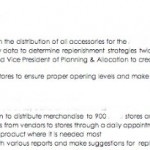If there is one moment in life that can shatter the nerves, it’s an interview process for a new job. You have likely spent hours trawling the jobs boards and making connections with local businesses to get hired, but when you get that email telling you that someone is interested in you, that cool demeanour goes flying out the window. Interviews can make or break your confidence when it comes to that job you applied for, and if you are already feeling nervous about being in front of a panel, this may not be an easy experience for you. Don’t panic, though. An interview is a learning experience and if you remember that you are interviewing them as much as they are interviewing you, you can nail the interview experience more easily than you think.
An interview is the chance for an employer to get a good idea of who you are, which is why some companies have quite a comprehensive interview process. Some companies start with a telephone conversation and then move onto a first stage interview, with a final stage set as a panel interview. These processes sometimes don’t make much sense to the interviewee, especially as most of the time the questions that are asked at the first stage are repeated in subsequent stages. The thing is, a company needs to get a thorough understanding of what you are expecting from the role and from them as a business, so these stages need to happen for them to gauge whether you are the right person.

If you want to be able to get through a panel interview with success, you need to know you don’t have to be afraid. Often, an interview procedure changes from an individual interview to a panel due to time constraints on the side of the business. You will have to adjust your usual interview technique when it comes to dealing with a panel, but the information that you relay will be almost identical. If you’ve been taking online classes with the Franciscan Missionaries of Our Lady University, you need to be open about how you are bettering yourself and your qualifications. There are so many things you can do be successful during panel interviews, and honesty and openness about your education and work experience are simply the first step to success. We’ve put together some tips for you to make your interview experience far easier and a lot less scary, so check them out below:
Tip 1: Get An Idea Of Your Panel
When you get told your interview is now a panel one, ask the recruiter or the person who you are dealing with in HR who the people on the panel are. This gives you a chance to check out their LinkedIn profiles and do a little research into their background. You can find out which part of the business they specialise in, and you can direct your answers to the questions by making them area-relevant for each person.
Tip 2: Think Ahead
You can’t predict what kind of questions you may get asked during the interview itself, but you can do a little research into the business and try to anticipate the types of questions that you may get asked. There are some generic interview questions that you should expect, and you can read some of them here in this article.

Tip 3: Introduce Yourself Properly
During a normal one-on-one interview, you get the chance to say hello and shake hands with your interviewer. This is no different in a panel, except that you need to make a point of looking each member of the group in the eye and shaking their hands individually. Ask for business cards and if these aren’t available, write the name down of each interviewer so that you have an idea of who is who during the interview.
Tip 4: Communication Is Key
When you are in a regular interview, you would maintain eye contact with your interviewer as you speak. This is still the case, but instead of just responding to the person who asked you the question, you need to look at each person so as not to exclude them from your response. Begin answering the person who put the question to you, then make a point of looking at everyone else on the panel. You want people to feel included and your body language really does matter!

Tip 5: Don’t JUST Answer A Question
When you are answering questions, branch out of the response you want to give and link it to your experience or qualifications. Always try and make links between your answers to each question so that your panel can see that you are listening and engaged with the interview itself.
Tip 6: Always Ask Your Own Questions
At the end of the interview, you will get asked if you have any questions, and most people reply to this with a ‘no’ because they are ready to go home and be done with the inquisition. However, this can be a bad thing to do. You are interviewing this company just as much as they are interviewing you, which means you should be asking them how they think that the interview has gone. This can often put interviewers on the spot, as they then have to give you live feedback. The beauty of this is that you then have the chance to rebuttal any concerns and discuss any issues that they feel you may have. This chance to talk through concerns means you are less likely to get that phone call to reject you.
An interview is a time for you to gauge whether a particular business is the right one for the development of your career. It is nerve-wracking, yes, but it’s also a shot for you to propel your career and your experience and give yourself a chance to do well. Go in with confidence, poise and a basket of muffins – they’ll always remember the interviewee who brought cake!








